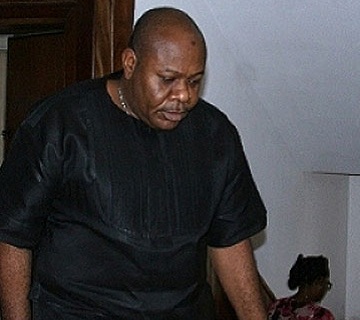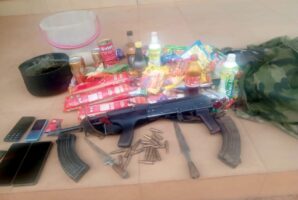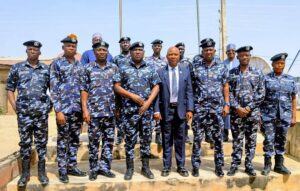The Special Offences Division of the Lagos High Court sitting in Ikeja on Wednesday refused to grant a fresh bail application filed by businessman, Fred Ajudua, who is facing an alleged $1.043m fraud trial.
His counsel, Olalekan Ojo (SAN), had asked Justice Mojisola Dada to admit him to bail pending the determination of his trial.
The lead defence counsel also told the court that his client, who was assisted to court by some medical personnel from the Lagos University Teaching Hospital (LUTH), has a chronic kidney disease.
Mr Ojo urged the court to grant his client bail to enable him to attend to his health challenges, saying only the living can face trial.
But, counsel to the EFCC, Seidu Atteh, objected to the bail application, saying the defendant was already before the Supreme Court seeking to set aside its earlier judgment and that he should have directed his application to that court.
In his counter arguments, Mr Ojo said his client was not before the Supreme Court to seek bail, and that there was no nexus between the application before the apex court and the instant application for bail.
In her ruling, Justice Dada held that she was inclined to await the outcome of the decision of the Supreme Court and would abide by it.
The judge said, “In view of the applications filed at the Supreme Court, I am constrained to make any decision with respect to this instant application filed by the defence counsel. I will abide by the decisions of the Supreme Court.”
Before deciding on bail, the court listened to the testimony of the third prosecution witness, an investigator with the EFCC, Afanda Bashir Emmanuel.
The witness told the court that he met the defendant in 2005, shortly after the establishment of the EFCC, and the defendant’s case file was handed over by the Special Fraud Unit (SFU) of the Nigerian Police Force (NPF) to the Advance Fee Fraud Section of the Commission, where he worked.
He also testified that in the course of the investigation, the Commission had written to the Police, the Central Bank of Nigeria (CBN), the Nigerian National Petroleum Company Limited (NNPCL) and the forensic lab of the EFCC to seek some documents in the investigation.
The defence counsel rejected a move by the EFCC to tender the documents in question as evidence. The counsel argued that the documents were not admissible as they were not original documents nor certified true copies of the public documents. The counsel also argued that the EFCC counsel was not the maker of the document and had laid no foundation for the photocopies tendered.
After counter arguments by the EFCC counsel, Justice Dada in her ruling, rejected two of the documents and admitted another two in evidence as exhibits.
Further hearing was adjourned to October 10 and 31, as well as November 20, to allow the defendant’s counsel to prepare to cross-examine the witness.
Fred Ajudua is standing trial for allegedly defrauding a Palestinian national, Zad Abu Zalaf, of the sum of $1,043,000 (One Million, Forty-Three Thousand U.S. Dollars) under false pretences.
The case, which began in 2005 before Justice Morenike Obadina of the Lagos State High Court, Ikeja, encountered several delays owing to what many had described as legal technicalities employed at the time by the defendant.
The matter was reassigned to Justice Josephine Oyefeso and later to Justice Mojisola Dada, before whom Mr Ajudua was finally arraigned on June 4, 2018.
Following the denial of his bail by Justice Dada at the time, he appealed to the Lagos Division of the Court of Appeal, which granted him bail on September 10, 2018. Dissatisfied with the appellate court’s ruling, the EFCC appealed to the Supreme Court.
The Commission also filed a separate appeal challenging the appellate court’s decision to transfer the case from Justice Dada to another judge to commence afresh (de novo).
Both issues were resolved in favour of the EFCC by the Supreme Court, which ordered Justice Dada to continue the trial of the case.
Read Also
- Trial of Ajudua's Alleged $1.043m Fraud Postponed Over Absence in Court
- Alleged Misappropriation: Court Again Adjourns Ganduje, Others’ Trial to Feb 3
- Alleged fraud: Court adjourns ruling on Emefiele’s application till September 15
- Alleged fraud: Emefiele collected $17.1m kickbacks over 3 years - Investigator





